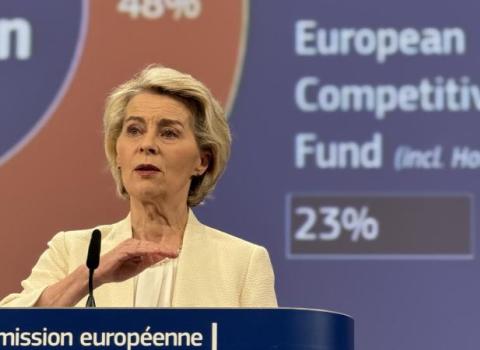The early planning stage of the next EU research programme will be pivotal in ensuring it enables data-intensive research and amplifies responsible AI development and the sustainable use of AI in research and innovation

Irina Kupiainen, public affairs director at CSC - IT Center for Science and Kimmo Koski, managing director at CSC - IT Center for Science.
Digital technologies have advanced more rapidly than any innovation in our history – reaching about half of the developing world's population in just two decades and reshaping societies.
Now, artificial intelligence (AI) is spearheading this revolution. AI is a key technology, so versatile that it can be used in almost any field and for research and innovation will be a game-changer.
Leveraging AI as a tool to accelerate the productivity of research could be the most economically and socially valuable of all the uses of it, according to a 2023 report from the OECD.
AI is entering more and more domains and stages of research. It is expanding researchers’ productivity and creativity by processing large amounts of research data, discovering underlying patterns, and generating predictions and models at a speed that was previously unimaginable.
This acceleration of research is extremely powerful, and positions AI to act as a catalyst for scientific breakthroughs and cutting-edge innovations. On a global scale this will strengthen the foundations that are so critical to help us address pressing societal challenges, such as climate change, cancer and pandemics. One example is ‘ComPatAI’, a Finnish project focusing on early cancer detection with the help of AI and the vast processing power of the EuroHPC LUMI supercomputer.
Geopolitical challenges
We cannot escape the fact that geopolitics and technology are increasingly intertwined. Current trends point to growing competition for AI leadership in research and innovation and which could lead to those at the forefront of AI advancement accumulating an even higher share of scientific discoveries at a faster pace, with a ‘winner takes it all’ logic.
If Europe falls behind in this race, it will be left out of the next breakthrough scientific discoveries and technologies. AI is ultimately about data and the capabilities, infrastructures, skills and policies for transforming it into something entirely new – be it in science or in business. In the last couple of years, EU has made vast investments in boosting its AI capabilities as a part of developing its data infrastructures, including the EuroHPC programme and European Data Spaces.
In the future, EU must continue to make collaborative, long-term investments in infrastructures and capabilities that will strengthen the growth and uptake of AI in research and innovation. This will not only bolster Europe’s data economy, but also enhance its competitiveness, strategic autonomy and resilience. Furthermore, a strong Europe never translates into an isolated Europe - it requires global collaboration with like-minded partners seeking solutions to shared challenges.
Comprehensive digital research
The next EU framework programme for research and innovation, Framework Programme 10 (FP10), will be a critical instrument in shaping European leadership. The programme must focus on excellence in research and technology and aim to build European competences in a sustainable way. The early planning stage will be pivotal in designing a programme that enables data-intensive research, and amplifies responsible AI development and sustainable use of AI and other digital technologies in research and innovation.
In putting the spotlight on specific digital technologies such as AI, quantum computing or virtual reality, there is a risk of generating the hype that can easily lead to oversimplified or siloed solutions.
To strengthen EU’s position, we must grasp the full picture of all the moving parts that are needed. A robust European digital research infrastructure ecosystem, capable of providing excellent data and high performance computing resources, forms the very backbone of AI development and data-intensive research and innovation. Furthemore, we need to systematically build the competences of people who use these instruments.
For example, the EuroHPC LUMI supercomputer is currently one of the most powerful AI platforms in the world, running applications such as large language models, and contributing significantly to building the competences of European researchers and companies. High performance computing provides the platform for AI, and EU has already laid important grounds for AI competiteveness through the EuroHPC Joint Undertaking. FP10 must be ready to fully tap into and leverage these resources from the very beginning.
A dynamic driver for sustainable future
FP10 has to be as dynamic as the digital transformation it is dealing with, and it will have to respond to changes that we cannot yet predict. Building new competences through research and innovation is the way to address global and societal grand challenges, and data-driven research enables the combination of vast amounts of data from different fields. FP10 can make a difference, and it must fully prioritise climate impact, energy efficiency, and cost efficiency, since this will have a huge and direct impact on the environmental burden, energy security and the way we use public money in Europe.
While digital research infrastructures are important in advancing sustainable and green solutions, they often have a high energy consumption, which will increase with AI-powered research and innovation. In the face of this, Europe must set impactful, consistent, life-cycle based sustainability indicators that will help to reduce the climate and environmental impact of all energy intensive industries.
FP10 must be in the forefront of developing and implementing such indicators, positioning Europe a as a global leader in responsible and sustainable research and technology.
Kimmo Koski is managing director at CSC - IT Center for Science. Irina Kupiainen is public affairs director at CSC - IT Center for Science.





 A unique international forum for public research organisations and companies to connect their external engagement with strategic interests around their R&D system.
A unique international forum for public research organisations and companies to connect their external engagement with strategic interests around their R&D system.